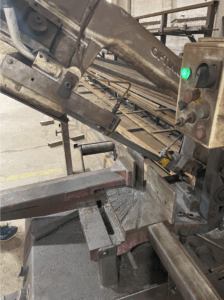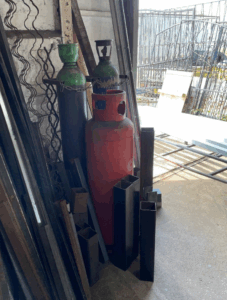Metal gate manufacturer fined after exposing workers to serious safety risks
A metal gate manufacturing company has been prosecuted after repeatedly ignoring Health and Safety Executive (HSE) enforcement notices.
Research and Development in Opening Gates Limited was first visited by HSE at its site in Grantham, Lincolnshire, where inspectors identified serious safety breaches, including unsafe equipment, inadequate control of welding fume, and poor structural integrity in workplace areas accessed by employees and visitors.
Three Improvement Notices were served following the initial inspection. These required the company to:
- Take effective measures to control employee and non-employee exposure to welding fume, a substance hazardous to health.
- Assess the structural safety of a mezzanine floor in use at the site.
- Ensure lifting equipment, including a forklift truck, had undergone a thorough examination to confirm it was safe to use.

Further material breaches were identified in a Notification of Contravention letter, including:
- Unguarded dangerous parts of machinery.
- Inadequate edge protection on the mezzanine floor to prevent falls from height.
- Electrical systems not constructed to prevent, so far as reasonably practicable, danger.
- Unsafe storage of flammable gases.
- No competent person appointed to assist with health and safety management.

Despite this enforcement, follow-up inspections revealed continued non-compliance. HSE returned to the site five more times, serving three additional Improvement Notices and one Prohibition Notice.
The Prohibition Notice was issued during a second visit in relation to ducting installed above welding benches. The ducting was supported by unstable and unsecured structures that were visibly bowing, posing a serious risk of personal injury should it collapse. The installation had been intended to control exposure to welding fume but was found to be unsafe and ineffective.
Two further Notification of Contravention letters were also sent to the company. During the intervention, compliance deadlines were extended on two occasions, but legal requirements were still not met. The company’s failings put employees, contractors and visitors at risk of serious harm. Reasonably practicable measures could have been taken to control these risks, but the company failed to do so.
An investigation by HSE found that Research and Development in Opening Gates Limited had failed to ensure the health, safety and welfare of its employees and others affected by its work activities. The company’s standard of health and safety management fell significantly below legal requirements, leading to a proactive prosecution.
HSE guidance states that employers must take effective measures to control exposure to hazardous substances such as welding fume. This typically includes providing engineering controls, like Local Exhaust Ventilation (LEV). Workplaces must also be structurally sound and lifting equipment must be examined regularly by competent professionals.
Research and Development in Opening Gates Limited, of Lea Bridge Road, London pleaded guilty to breaching Sections 2(1) and 3(1) of the Health and Safety at Work etc. Act 1974. The company was fined £40,000 for each offence, totalling £80,000, and ordered to pay £7,495.72 in costs, along with a £2,000 victim surcharge. The sentence was handed down at Lincoln Magistrates’ Court on 12 June 2025.
HSE inspector Muir Finlay said:
“This prosecution follows a catalogue of failures, all of which posed serious risks to both the health and safety of workers and visitors of the site.
“The company failed to implement basic, well-understood measures to control risks. Health and safety must be effectively managed — it’s not optional.”
This HSE prosecution was brought by HSE enforcement lawyer Matthew Reynolds and paralegal officer Jason Dix.
Notes to editors
- The Health and Safety Executive (HSE) is Britain’s national regulator for workplace health and safety. We are dedicated to protecting people and places, and helping everyone lead safer and healthier lives.
- More information about the legislation referred to in this case is available.
- Further details on the latest HSE news releases is available.
- HSE does not pass sentences, set guidelines or collect any fines imposed. Relevant sentencing guidelines must be followed unless the court is satisfied that it would be contrary to the interests of justice to do so. The sentencing guidelines for health and safety offences in England and Wales can be found here and for those in Scotland here.
- Link to relevant HSE guidance: Welding fume: protect your workers – HSE